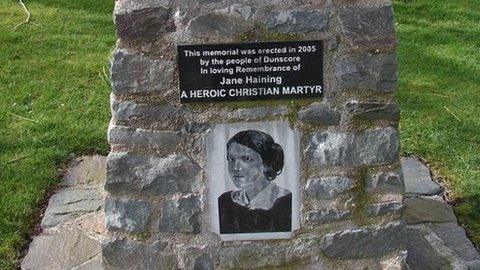Jane Haining: The Scot who died in Auschwitz
- Published
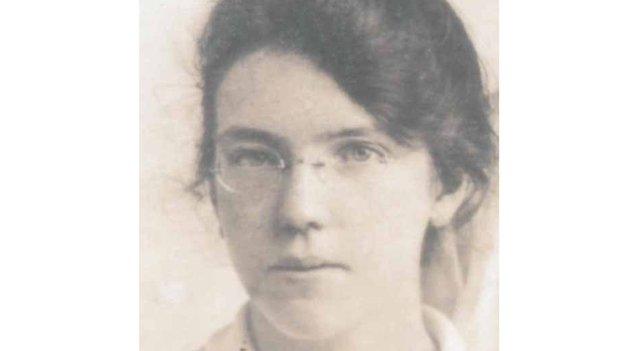
Jane Haining is the only Scot to be officially honoured for giving her life for Jews in the Holocaust
Jane Haining was a quiet farmer's daughter from the south of Scotland who ended her life as a slave labourer in the most notorious extermination camp the world has ever known.
She is the only Scot to be officially honoured for giving her life for Jews in the Holocaust.
But her life began a long way from the barbed wire fences of Auschwitz - among the rolling hills of rural Dumfriesshire.
Jane Haining was born in Dunscore in 1897. Her mother died when she was just five years old and she took on much of the care of her younger sisters.
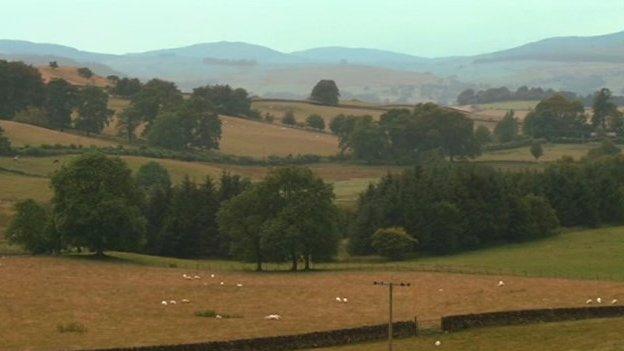
Jane grew up in Dumfriesshire, a long way from the barbed wire of Auschwitz
After leaving Dumfries Academy, where she was an excellent student who was good at languages, Jane took a secretarial job at the huge JP Coats weaving factory in Paisley.
While there she attended church at Queen's Park West in the Crosshill area of Glasgow.
It now has stained glass windows in memory of a woman who was driven by a strong Christian faith.
In 1932 she saw an advert for a job as matron to the Scottish Mission to the Jews in Budapest.
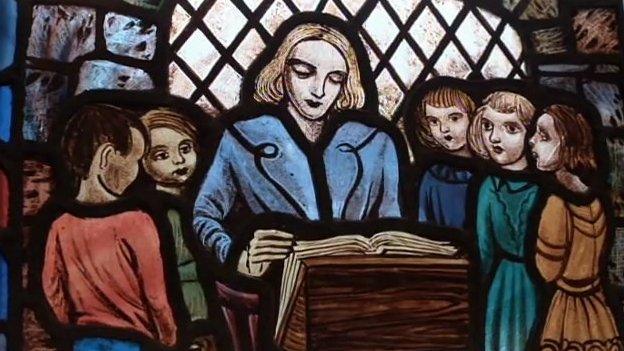
Jane Haining is depicted on a stained glass window in the Queen's Park church
Dr David Kaufman, director of the centre for the study of Modern Conflict at the University of Edinburgh, says the Hungarian city had a burgeoning middle-class Jewish population.
He says it was often dubbed 'Jewdapest' because 60% of the doctors and half of the lawyers in the city were Jewish.
The life and worship of the Church of Scotland mission school were overtly Christian but Jewish parents clamoured to get their children educated there.
Rev Aaron Stevens, minister at the present-day St Columba's Church of Scotland in Budapest, says: "I think it had to do with the quality of the education the girls received and also with the way the girls were accepted.
"Jewish girls who came here were not seen as second class pupils. They were just as welcome."
Rev Stevens describes Jane's role as the mother for those who were not living at home any more.
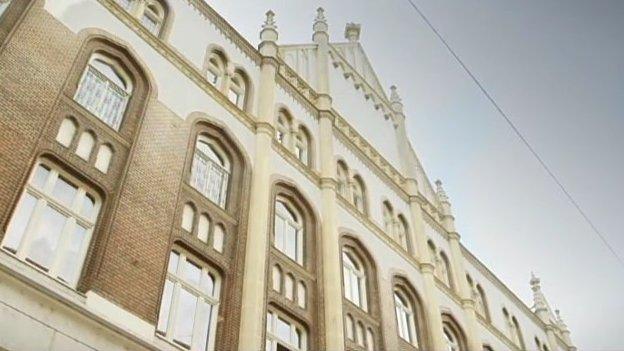
Jane worked at the Scottish mission school in Budapest
Former pupil Katalin Packard told BBC Scotland documentary Jane Haining: The Scot who died in Auschwitz that she remembered Jane being "kind and welcoming and warm".
For her pupils Jane Haining embodied the values of fairness, tolerance and equality that drove the whole Scottish mission.
"We never felt we were not equal with each other or with the Christian pupils", says another former pupil Dr Zsuzanna Pajzs.
"We did not even notice who was Christian and who was Jewish."
Less than a year after Jane arrived in Budapest, Hitler was elected chancellor of Germany. He was the most powerful force in the turning against Jews which occurred across Europe in the 1930s.
Dr David Kaufman says: "The Hungarian political elite tended to gravitate towards Nazi Germany in the 1930s.
"The Hungarian Jewish population see themselves as different from the rest of the Jewish populations of Eastern Central Europe.
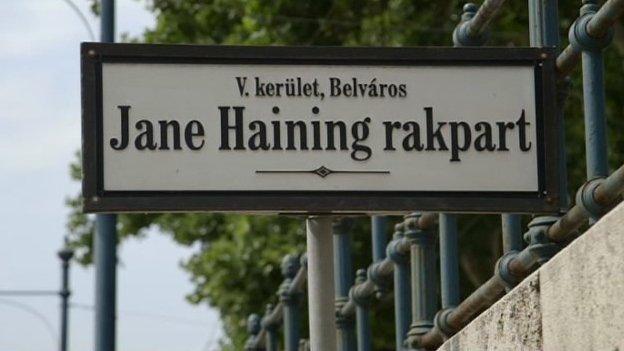
The Municipality of Budapest has named a section of embankment after Jane
"They see themselves as successfully assimilated within Hungarian culture. But in social terms they are not really accepted because there is still a latent, casual anti-Semitism which pervades Hungarian society."
In 1939 the Nazis invaded Poland and Britain declared war on Germany.
Hungary's Nationalist government began to concede anti-Semitic laws in a bid to undermine its more demanding fascist sympathisers before then allying itself with Germany.
The authorities started to detain Jews who had lived in Budapest for decades without citizenship.
As more and more territories fell to the Nazis, Hungary's alliance with Germany kept invasion at bay.
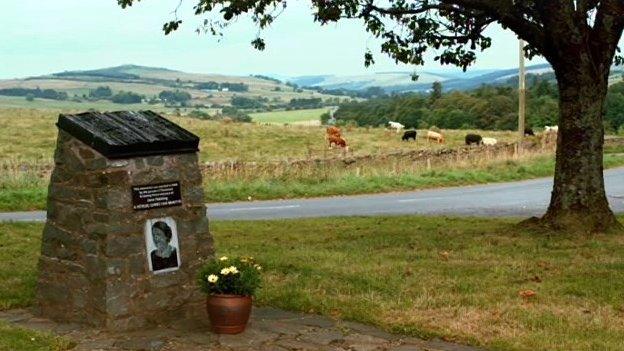
There is a memorial to Jane Haining in the village of Dunscore
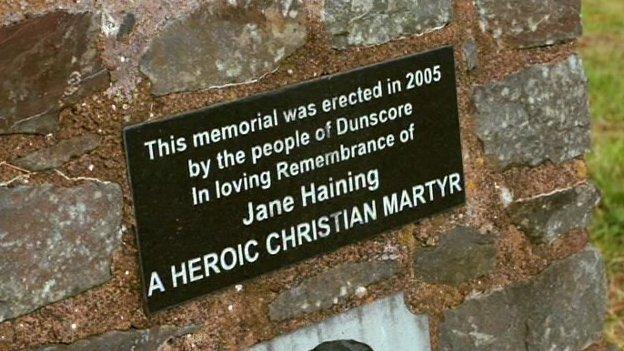
The government continued to protect the lives of its Hungarian Jews. But they did lose jobs, social position, civil rights and respect.
Former pupil Eve Haller, now a prominent social activist in America, has never forgotten how the Scottish Mission school restored that respect.
However, the Church of Scotland was increasingly alarmed for the safety of its missionaries and sent repeated letters urging Jane Haining to come home.
She refused and wrote: "If these children needed me in days of sunshine, how much more do they need me in these days of darkness?"
"She could not grasp the evil in which she was functioning," says Annette Lantos, former pupil.
"It was not part of her ability to understand what she was confronted with. She lived in a different world. A world that was civilised and reasonable and rational, where people did not kill each other for no reason."
Then the outlook suddenly darkened further, when Hitler turned his attention to Hungary and its Jews.
On a Sunday afternoon in March 1944 Nazi troops marched into Budapest.
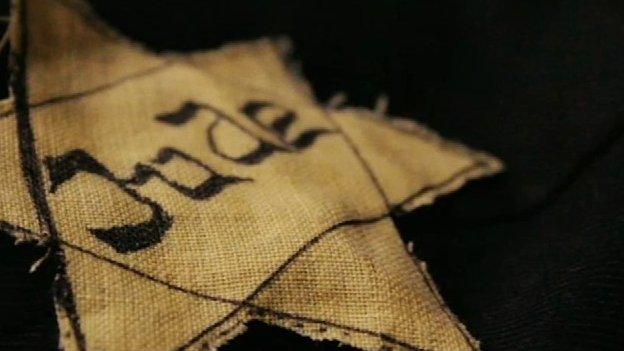
Jane wept as she sewed on the yellow stars to mark her pupils as Jews
Jane Haining is said to have wept as she sewed on the yellow stars that branded her children as Jews.
Her open sympathy put Jane in grave danger.
It only took one incident to light the touch paper.
Within weeks of the invasion Jane scolded the cook's son-in-law for eating food intended for the girls. He informed on her. The next morning a Gestapo police car arrived at the school.
She was arrested on suspicion of "espionage on behalf of England".
She was originally taken to the local prison but soon she was taken to Poland, to Auschwitz, as the industrial slaughter of Jews was reaching its zenith.
About 12,000 Hungarian Jews every day were being packed off to Auschwitz. Most went straight to the gas chambers.
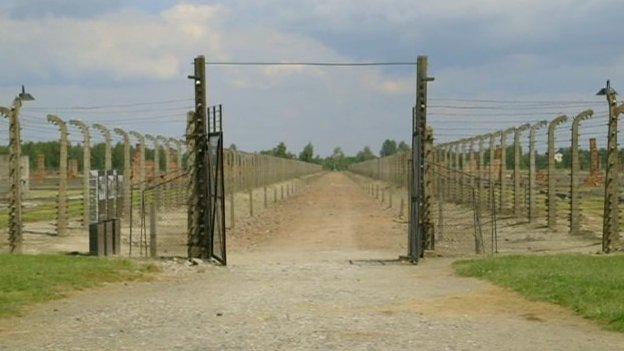
Jane was forced to work in the labour camps at Auschwitz
In all, more than a million human beings were killed at Auschwitz.
Jane Haining was a political prisoner so she was taken to the labour camps where inmates were screamed at, beaten and chased with dogs.
She survived just two months. She was just 47.
According to her death certificate, she died of "cachexia following intestinal catarrh".
Whether Jane died of starvation, illness or disease and died in hospital or whether she was actually gassed like many women who became too ill to work cannot be known for sure.
It took a long-time before Jane Haining's death was recognised.
In 1997 after an initiative from Queen's Park church and a 10-year investigation by an Israeli board, Jane was named as Righteous Among the Nations in Jerusalem's sacred Yad Vashem.
In 2010 she was awarded a Hero of the Holocaust medal by the British government.
Her death was anonymous and without show but her quiet sacrifice for those Jewish children has now been recognised throughout the world.
Jane Haining: The Scot Who Died in Auschwitz is available on the BBC iplayer.
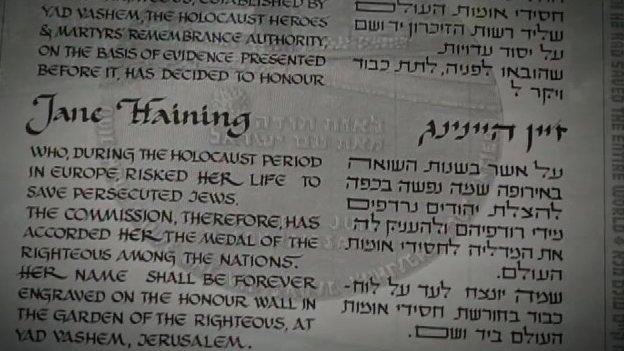
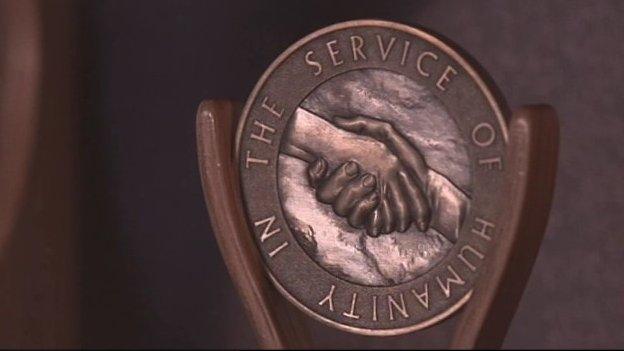
In 2010 she awarded a Hero of the Holocaust medal by the British government
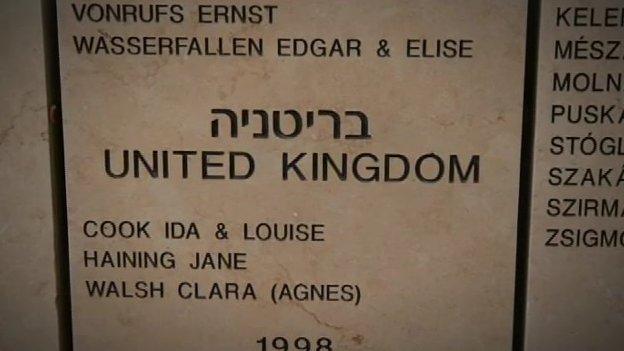
Jane is honoured at Yad Vashem in Jerusalem
- Published31 May 2012
